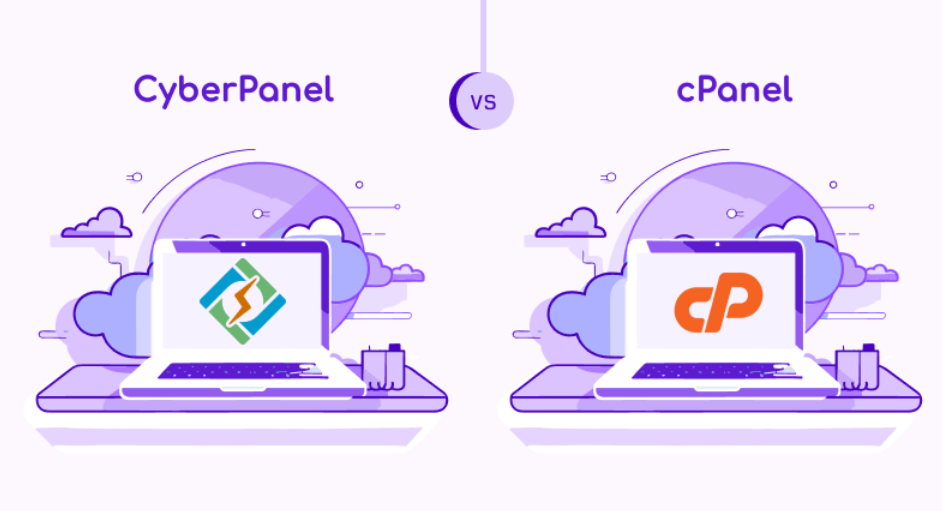Considering that the tendencies in the web hosting industry are rapidly changing, the hosting control panel should be chosen as it determines further the efficiency, safety, and convenience of the website. With many options available, CyberPanel and cPanel have emerged as two of the most popular choices.
Both are creatively designed and come with various features and advantages, making it challenging for many users to choose between them. In this blog post, we compare CyberPanel to cPanel and want to ensure you can select the backing hosting control panel for your project.
Overview of CyberPanel and cPanel
CyberPanel and cPanel are leading hosting control panels, each with distinct characteristics. cPanel, launched in 1996, is a seasoned player known for its reliability and robust feature set. Linux servers power it, and it is easy to use while serving the purpose of managing web hosting platforms. It remains a long-time market player, making its dependability a well-entrenched suspect.
CyberPanel, a more recent entrant, utilizes OpenLiteSpeed web server technology, emphasizing speed and efficiency. This is a modern controlling panel; we have an open source and these facilities are suitable for performance-oriented hosting. Another new feature of CyberPanel is the associated plugin for WordPress, LSCache, and GIT for approximately the users who looking for brush-up and personal functions.
Some of the features that came with the cPanel are, Domain management, establishing an email, and getting access to many of the web applications unlike with CyberPanel, speed and functionality are its main claims to fame in addition to the API and OpenLiteSpeed. Every single control panel has a specific market and features that help make web hosts easy to use and efficient to manage in different ways.
Key Features Comparison
CyberPanel and cPanel offer various features tailored to different user needs. cPanel includes various practical tools for domain, email, and database configuration. Since it supports multiple programming languages and provides an immense variety of third-party scripts in Softaculous, this tool can be considered a relatively convenient solution for managing web hosting.
CyberPanel, on the other hand, emphasizes performance with its built-in WordPress installer, LSCache support, and GIT integration. It also offers an API for advanced control and automation, appealing to developers seeking customization options. Powered by OpenLiteSpeed, CyberPanel ensures faster server response times, enhancing overall performance for hosted websites.
For instance, although cPanel contains many instruments for operating the hosting setting, which is beneficial for management, CyberPanel attempts to speed up high-capacity settings.
Ease of Use and User Experience
cPanel’s interface is well-organized, featuring icons that represent various tasks, which helps users navigate and execute actions efficiently. It reduces the training time as much as possible, and the program’s extensive documentation helps the users master the control panel in no time. It may be considered the best option for the audience who is in search of a simplified and unproblematic interface.
CyberPanel, while also user-friendly, offers a more modern design aesthetic. It has one-click tasks on the dashboard, making it easy to solve complex tasks so operations can quickly be completed. However, it may take some time for those new to OpenLiteSpeed to learn about the app. Nevertheless, CyberPanel is configured and developed to be as easy to use as possible and, therefore, competes well in this sphere with other panels for both novices and experienced users.
Security Measures and Protocols
Security is a crucial aspect of web hosting. Available security option in cPanel includes a host of features to ensure your website is secure to the best of your abilities. This includes automatic SSL certainty issuance that will help encrypt data being transferred between the server and the client.
That is, IP address blocking prevents one from accessing information they are not supposed to. At the same time, directory protection provides a higher level of security regarding file directories. Two factors of the authentication process also add up with passwords for additional directories to make this security even more robust.
On the other hand, CyberPanel has a Mod Security web application firewall that is integrated into the tool to act as a shield against all sorts of threats, including, but not limited to, SQL injections and cross-site scripting. CyberPanel also has Let’s Encrypt SSL certificates to make it easy and free to implement HTTPS. CSF Firewall is also helpful in offering protection against all intended ill actions and unauthorized access to the system.
The two control panels are secure, while CyberPanel integrates the performance advantages of OpenLiteSpeed and the security features. This integration assists in managing the traffic on the web and, at the same time, enhances security measures. Whether it’s cPanel’s tried-and-tested security protocols or CyberPanel’s modern, performance-focused security features, both control panels offer robust solutions to keep your website secure.
Performance and Reliability
Performance is pivotal in the success of any website, affecting user experience and search engine rankings. cPanel is also relatively stable, can support multiple server configurations, and is quite suitable for high traffic. The mature architecture guarantees muscular availability and dependable reliability to accommodate the many hosting requirements.
CyberPanel, leveraging the power of OpenLiteSpeed, excels in speed and resource efficiency. OpenLiteSpeed can provide several fast speeds and minimal resource use and is perfect for websites that need high loading speeds and the capacity to manage heavy traffic. CyberPanel is very suited for multiple connections, so the sites would stay fully functional even in spite of high traffic.
One more benefit obtained from CyberPanel is the ability to link with LSCache which helps to decrease the load on servers, as well as the frequency of websites’ page loading. This means that CyberPanel will find it particularly effective in the dynamically generated content site, including business uses of Internet technology for their electronic sales, for example, e-sales, and the web-2 websites, for example, blogs.
Thus, both panels are stable, however, CyberPanel is not positioned as targeting highly advanced enhanced functionality but it operates better under high loads.
Pricing and Value for Money
When evaluating the pricing and value for money of hosting control panels, it’s essential to consider the specific needs of your website and budget. cPanel operates on a commercial model with licensing fees that scale based on the number of accounts you manage. To small businesses or individuals who run several websites, these costs can be compared and thus more than the cost of cPanel. However, most people are willing to pay for it because of the extensive features, constant updates, and quality support offered by cPanel that increases the usability of the server.
On the other hand, CyberPanel offers a more budget-friendly approach. The free version of CyberPanel provides a range of essential features that cater to most basic hosting needs, making it an appealing option for those with limited budgets.
For users requiring more advanced functionalities, CyberPanel’s Enterprise version is available at a competitive price point, offering enhanced support and additional features. This level of pricing model brings convenience in the sense that users will subscribe to specific plans depending on their needs without necessarily breaking the bank.
Open-source CyberPanel also has advantages in providing users the value of participation and contribution from the community. Users benefit from a constantly evolving platform without incurring significant costs. This flexibility benefits startups, developers, and tech-savvy individuals who can leverage community resources to customize and optimize their hosting environment.
In summary, both cPanel and CyberPanel offer valuable features and support. While cPanel may have higher costs, its comprehensive tools and reliability can justify the investment. Conversely, CyberPanel’s flexible, cost-effective pricing structure makes it an attractive option for users seeking robust performance without breaking the bank.
User Reviews and Community Support
User feedback and community support are integral to the ongoing development and usability of both CyberPanel and cPanel. One of the significant advantages of cPanel is it has a large number of users enjoying its functionality for years, and this has produced a large base of tutorials, forums, and other documentation. Such a rich number of resources allows users to solve their problems as soon as possible, and constant participation in cPanel forums guarantees fast solutions even to rare difficulties.
CyberPanel, despite being relatively new, has rapidly built a loyal following. The open-source nature of CyberPanel fosters a collaborative environment where users and developers contribute to forums, tutorials, and GitHub repositories. This cooperative spirit ensures a dynamic exchange of ideas and solutions, which can benefit users looking to customize their hosting environment.
Both control panels benefit from active community engagement, but the pace and style of support can differ. cPanel has been around for a long time and has highly optimized and experienced support with detailed historical context, while the CyperPanel community is absolutely up-to-date with the latest trends and product developments. Another potential advantage of CyberPanel is that it is open-source software: cyberattacks may require more often updates and can bring new features brought by the users.
Conclusion and Final Recommendation
Deciding between CyberPanel and cPanel ultimately boils down to your specific requirements and what you value most in a hosting control panel. All in all, cPanel offers a good and rather long-standing All-Rounder Isolator that may well support many Linux webmasters and has an enormous number of constructed-in references available. The number of features is impressive and it is shielded by reliable security measures that make it a good platform for different types of hosting.
Conversely, CyberPanel appeals to those seeking a modern, high-performance control panel with cost-effective pricing. The integration with OpenLiteSpeed and built-in tools like LSCache and GIT support cater to users focused on speed and efficiency. Its open-source nature and active community offer additional flexibility for customization and innovation.
Both control panels provide substantial benefits, but your choice should reflect your hosting priorities. For businesses requiring a stable, well-documented platform, cPanel is ideal. If you are a developer or a startup trying to focus on speed and performance and do not want to spend too much on hosting, CyberPanel is definitely for you.
In making a decision about web hosting solutions it is important to take into consideration these features, the user experience, security, and performance as well as the prices articulated in this comparison. In either case, starting with an understanding of what makes CyberPanel or cPanel unique will assist you in fine-tuning your hosting environment to maximum potential.




